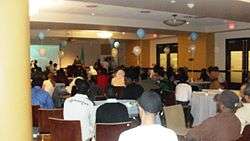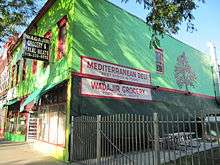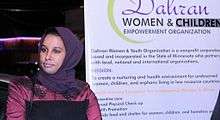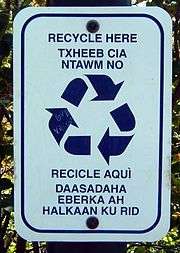History of the Somalis in Minneapolis–Saint Paul
| Part of a series on |
| Ethnicity in Minneapolis-Saint Paul |
|---|
|
|
|
Somalis are a major ethnic group in the Minneapolis–Saint Paul (Twin Cities) urban area. As of 2013, there were around 25,000 Somalis in Minnesota.[1]
History

Ethnic Somalis first emigrated to the Twin Cities as voluntary migrants in the 1980s and earlier. They journeyed to attend scholastic institutions or to establish businesses, including many professionals. Other Somalis arrived in the United States after the start of the civil war in Somalia during the early 1990s, or from other parts of Greater Somalia.[2][3] Many of the newer arrivals moved to Minnesota through voluntary agencies (VOLAGS), who helped them settle in.[4] Somalis that had arrived earlier also assisted the more recent immigrants.[2]
Somalis in the Twin Cities and elsewhere in the United States often send resources to their extended families abroad, remittances that were facilitated by the signing of the Money Remittances Improvement Act.[5] Following a greatly improved security situation in Somalia in 2012, many Somali U.S. residents have also begun returning to Mogadishu and other parts of the country.[6] A few of the homeward-bound immigrants along with some American-born associates have been sought and/or prosecuted for allegedly providing material support to the Al-Shabaab and Islamic State political militant groups.[7][8] However, according to intelligence officials, fewer expatriates were joining the groups' ranks by late 2013.[9][10] Most of the returnees have instead repatriated for investment opportunities and to take part in the ongoing post-conflict reconstruction process in Somalia. Participating in the renovation of schools, hospitals, roads and other infrastructure, they have played a leading role in the capital's recovery and have also helped propel the local real estate market.[6]
Demographics

According to 2010 American Community Survey data, there are approximately 85,700 Somalis in the United States, around 25,000 of whom live in Minnesota.[1] They reside throughout the Twin Cities metropolitan area and the surrounding towns. Many Somalis inhabit Minneapolis' Cedar-Riverside neighborhood, particularly newly arrived immigrants. Somali professionals often move to the suburbs to raise their children in a more secure environment away from the inner city. Although Somalis have established ethnic enclaves, there is an easy commute between Somali areas and the wider metropolis.[2]
Commerce

Somalis in Minnesota have established many community enterprises. In 2006, they accounted for $164–$394 million in purchasing power and owned 600 businesses.[11] Minneapolis in particular hosts hundreds of Somali-owned and operated commercial ventures. Stalls inside several Somali shopping malls offer everything from halal meat, to leather shoes, to clothing for men and women, as well as gold jewelry, money transfer or hawala offices, banners advertising Somali films, video rental stores fully stocked with nostalgic love songs not found in the mainstream supermarkets, groceries and boutiques.[12] Workplaces in the state have in turn grown more culturally sensitive and accommodating of differing religious traditions.[13]
Community organizations

The Somali community in Minnesota is represented by various Somali-run organizations. Among these are the Confederation of Somali Community in Minnesota (CSCM) and Somali American Parent Association (SAPA), which offer a number of social services to the state's resident Somalis.[14][15]
This support system within the Somali community originates from a sense of shared responsibility towards other Somalis. The Somali community organizations provide ESL classes, job finding, legal advocacy and union services to their constituents.[2]
Politics

Politically, a Somali American Caucus in the Minnesota Democratic–Farmer–Labor Party (DFL) was formed to represent the Somali community.[16] A Somali American also chairs the Republican Party's Immigrant Relations Committee in Minnesota.[17]
Notable residents
- Abdi Warsame, politician, member of the Minneapolis City Council
- Abdirizak Bihi, social activist
- Anisa Hajimumin, politician, Minister of Women & Family Affairs of Puntland
- Fathia Absie, broadcaster, writer and filmmaker
- Nuruddin Farah, writer
- Saado Ali Warsame, singer-songwriter
- Sahra Noor, social activist and entrepreneur
- Ilhan Omar, politician, member of State House of Representatives
See also
References
- Rutledge, Doug (2008). The Somali Diaspora: A Journey Away. University of Minnesota Press. ISBN 978-0-8166-5457-4.
Notes
- 1 2 "Survey: Nearly 1 in 3 US Somalis live in Minnesota". Minnesota Public Radio. 14 December 2014. Retrieved 6 February 2014.
- 1 2 3 4 Rutledge, p.135.
- ↑ Barkan, Elliott Robert (editor). Immigrants in American History: Arrival, Adaptation, and Integration. ABC-CLIO, 2013. ISBN 1598842196, 9781598842197. p. 693.
- ↑ "2014 MAA-CBO Directory" (PDF). Minnesota DOH. Retrieved 6 April 2016.
- ↑ "Ellison and Paulsen Reintroduce Money Remittances Improvement Act To Help Somali Families Send Money Home". House Office of Keith Ellison. 6 May 2014. Retrieved 26 August 2014.
- 1 2 "SOMALIA: Returning diaspora help rebuild". Heegantimes. Archived from the original on April 20, 2013. Retrieved 19 February 2015.
- ↑ Gred Moran (31 January 2013). "Terror Trail of 4 Somalis Begins". San Diego Union Tribune.
- ↑ Forliti, Amy (21 April 2016). "Feds: Minnesota men spoke of terrorist attacks in US". Associated Press.
- ↑ "Al-Shabaab Recruits in the U.S.". CNN. 23 September 2013. Retrieved 28 September 2013.
- ↑ "Report: ISIS publishes 'kill list' for Minnesota police officers". Washington Examiner. Retrieved 8 May 2016.
- ↑ Economic Contributions of Somalis in Minnesota
- ↑ Talking Point by M.M. Afrah Minneapolis, Minnesota (USA) Aug., 12. 2004
- ↑ Rutledge, p.137.
- ↑ "CSCM - About Us". Confederation of Somali Community in Minnesota. Retrieved 9 February 2013.
- ↑ "Somali American Parent Association". Somali American Parent Association. Retrieved 9 February 2013.
- ↑ "Somali American Caucus". Minnesota Democratic–Farmer–Labor Party. Retrieved 9 February 2013.
- ↑ Shah, Allie (13 October 2012). "Somali-Americans begin making mark on local politics". Star Tribune. Retrieved 9 February 2013.